Monday Feb 16, 2026
Monday Feb 16, 2026
Monday, 13 March 2023 00:50 - - {{hitsCtrl.values.hits}}
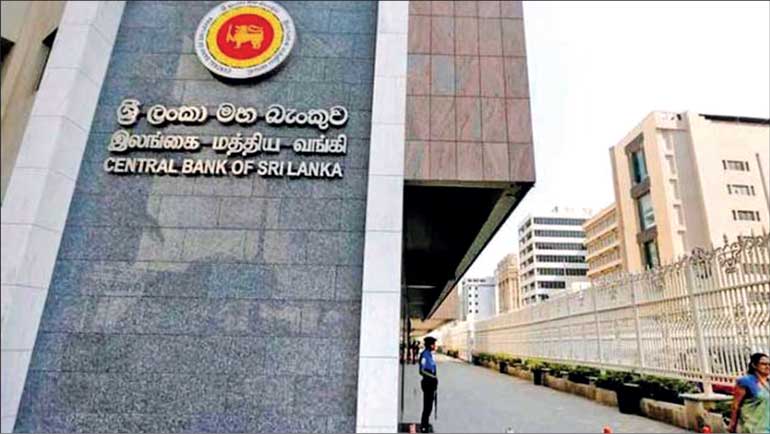
These provisions in the new central bank bill are an improvement of the provisions in the existing MLA relating to the bank’s accountability. However, they are not of any use if they are confined only to just reporting of the facts
 In the previous part, we discussed the positive features that have been introduced to the proposed central bank bill (available at: https://www.ft.lk/columns/New-central-banking-bill-Positive-but-gaps-need-to-be-filled-Part-I/4-746017). In today’s part, we will look at some serious gaps in the new bill that will compromise ‘the autonomy’ that has been granted to the new central bank under the new bill.
In the previous part, we discussed the positive features that have been introduced to the proposed central bank bill (available at: https://www.ft.lk/columns/New-central-banking-bill-Positive-but-gaps-need-to-be-filled-Part-I/4-746017). In today’s part, we will look at some serious gaps in the new bill that will compromise ‘the autonomy’ that has been granted to the new central bank under the new bill.
Central Bank autonomy
The Central Bank needs autonomy with respect to two main functions. One is the independence to carry out the policy of the bank concerning the monetary policy and the policy relating to financial system stability. The other is the independence of the bank to prepare its own budget without going through the Parliament as in the case of other governmental bodies. In the present Monetary Law Act or MLA, the budget independence has been assured for the Central Bank and there is not any dispute about it.
With regard to policy independence, though it is there in theory, it has been disputed because of the influence of the Treasury Secretary sitting on the Monetary Board as a vote carrying member in making its policies. The new central bank bill was expected to strengthen the bank’s independence not only in theory but also in practice. However, it seems that the new bill has seriously compromised these aspects of independence of the bank.
It is only administrative and financial autonomy that has been spelt out
The bill has stipulated that the ‘Central Bank shall have administrative and financial autonomy’. This refers only to the Central Bank’s independence to prepare its budget and run its day-to-day affairs. For instance, there is no necessity for the Minister of Finance to approve its budget or the appointment of officers. A serious gap in this provision is that it does not refer to the need for having independence to design and implement monetary policy and financial system stability policy without the interference of those in power. This dilution of autonomy is further compromised by the powers entrusted with the Minister of Finance in recommending the Governor, six members to the Governing Board, and two members to the Monetary Policy Board to the President and finally appointing Deputy Governors who are also members of the latter board.
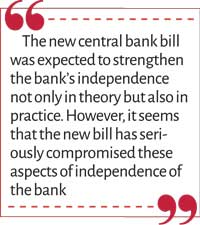 Therefore, though the Treasury Secretary is not there sitting on the governing board or the monetary policy board, all members including the Governor of the Bank are recommended by the Minister without following any procedure laid down for it. Therefore, by appointing those who are amenable to him, he could more effectively control the day-to-day administration, the budget, and the key policies of the Central Bank. As a result, instead of establishing the autonomy of the Central Bank, the new bill has seriously diluted it.
Therefore, though the Treasury Secretary is not there sitting on the governing board or the monetary policy board, all members including the Governor of the Bank are recommended by the Minister without following any procedure laid down for it. Therefore, by appointing those who are amenable to him, he could more effectively control the day-to-day administration, the budget, and the key policies of the Central Bank. As a result, instead of establishing the autonomy of the Central Bank, the new bill has seriously diluted it.
Minister’s unnecessary powers
This serious gap could have been avoided had the Minister of Finance been removed from recommending the Governor, and board members, and appointing deputy governors. There is no case for a politician who has assumed political power for a given period recommending members or appointing deputy governors to an autonomous entity. In addition, in the new bill, the Minister is empowered to appoint an outsider also as a deputy governor. In a political culture where those in power anticipate life-long loyalty from those who have been recommended or appointed by them, such an arrangement is a threat to the autonomy of the Central Bank. Hence, instead of the appointment process that has been incorporated in the new bill, a nomination and a selection process should have been introduced.
 In this process, a nomination committee could be appointed by the existing Governing Board or the Monetary Policy Board which should start its work well before the relevant position falls vacant. The nomination committee can invite nomination of suitable persons for the relevant posts or head hunt them by itself, subject them to a stringent screening process through informal discussions and interviews and nominate three names to the Constitutional Council for recommending one name to the President for appointment. That would have been a more objective method of appointing people on merit who do not have a loyalty to the person who have recommended or appointed them.
In this process, a nomination committee could be appointed by the existing Governing Board or the Monetary Policy Board which should start its work well before the relevant position falls vacant. The nomination committee can invite nomination of suitable persons for the relevant posts or head hunt them by itself, subject them to a stringent screening process through informal discussions and interviews and nominate three names to the Constitutional Council for recommending one name to the President for appointment. That would have been a more objective method of appointing people on merit who do not have a loyalty to the person who have recommended or appointed them.
In the case of deputy governors, the minister should not have any role in appointing them because their appointment should always be based on merit after subjecting them to a stringent screening process That power should be left with the Monetary Policy Board which knows its job much better than a politician who has got into that position for a limited period.
Appointing an outsider as a deputy governor should be based on the needs
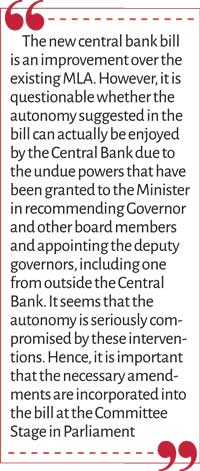 There is no necessity to stipulate in the bill itself that an outsider could be appointed as a deputy governor. That choice is available even in the present Central Bank setup, though it is not specifically laid down in MLA. Accordingly, if the Monetary Board which is the current appointing authority in consultation with the Minister of Finance could do so depending on the need of the day. In the whole history of the Central Bank, the Monetary Board did it only once when it appointed Professor Theodore Morgan of the University of Wisconsin as Deputy Governor of the Bank in 1953. Parachuting him from outside was done in order to get his expertise to design and conduct the first ever consumer finance survey by the bank and prepare the groundwork for the compilation of the national accounts.
There is no necessity to stipulate in the bill itself that an outsider could be appointed as a deputy governor. That choice is available even in the present Central Bank setup, though it is not specifically laid down in MLA. Accordingly, if the Monetary Board which is the current appointing authority in consultation with the Minister of Finance could do so depending on the need of the day. In the whole history of the Central Bank, the Monetary Board did it only once when it appointed Professor Theodore Morgan of the University of Wisconsin as Deputy Governor of the Bank in 1953. Parachuting him from outside was done in order to get his expertise to design and conduct the first ever consumer finance survey by the bank and prepare the groundwork for the compilation of the national accounts.
Morgan accomplished both tasks within one year and his term was accordingly terminated in 1954. Since then, the Monetary Board did not feel it necessary to appoint an outsider as the Deputy Governor of the Bank and the position was always left to the career central bankers from within. Hence, the present position specific provision in the bill will enable politicians to plant someone loyal to them in the position of the deputy governor and it does not augur well for the smooth functioning of the Central Bank.
Monetary Policy Board
The intention of setting up a separate monetary policy board was to allow the Central Bank to conduct monetary policy independent of the bank’s other functions. However, the way the membership of the monetary policy board has been constituted has defeated that objective. According to the provisions of the bill, this board is made up of the Governor, six members appointed to the Governing Board, two additional members appointed specifically for this purpose and the deputy governors in charge of price stability and financial system stability. As a result, the monetary policy board has subsumed the governing board and therefore does not have an independent existence. Hence, the governing board has influence over the monetary policy board, but the latter does not exercise any influence over the former. This is a serious distortion of the governance structure of the new central bank.
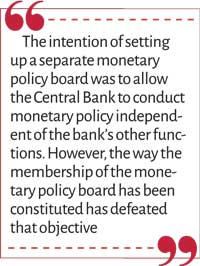 The term of the Governor
The term of the Governor
Another omission of the bill is the non-specification of the term of the Governor. In the transitional provisions of the bill, it has been specified that the present Governor will be the Governor of the new Central Bank as well. However, he holds the position only for twelve years including the period he has already served as the Governor. But the bill is silent on the term of the new governors appointed to the Central Bank. This is not the case with the members of the Governing Board or the Monetary Policy Board. In their case, the term has been specified as six years and limited only to two terms. It is therefore necessary to make a like provision relating to the term of the governor as well. Since the bill cannot be changed now, this could be done as an amendment at the Committee Stage of the debate in Parliament.
A negotiable bond for government debt
The Government is at present indebted to the Central Bank for a sum of Rs. 2.8 trillion, made up of Rs. 2.6 trillion by way of investing in Treasury bills and another Rs. 200 billion by way of provisional advances. These claims on the Government should be transferred to the new Central Bank as well. However, since there is a demand for the domestic debt reorganising, the Government can selectively choose which domestic debt should be reorganised. In the transitional provisions of the bill, it has been specified that a negotiable debt instrument should be issued to the Central Bank for about 10 years.
This option is favourable to the Government since it is freed from making interest payments, then and there, when the Treasury bills in question mature. But it is unfavourable to the Central Bank because it loses the important annual interest receipts. Since the interest income from Treasury bills is the main income source of the central bank to pay for its expenditure, the non-receipt of this important income will jeopardise cash flow of the central bank as against its annual expenditure programs.
The accountability of the Central Bank
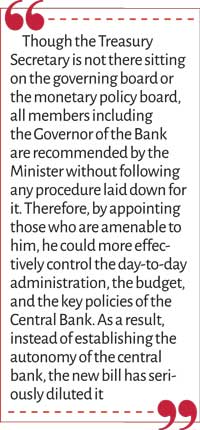 The accountability of the Central Bank is more clearly spelt out in the new central bank bill than in the existing MLA. One area of accountability is the declaration of a target for the inflation which the Central Bank should attain in agreement with the Minister of Finance. This is called the inflation targeting monetary policy framework, quite different from the money supply and or reserve money targeting monetary policy being pursued by the bank at present. There is an underlying inflation target in the present monetary policy framework too. In this framework, the Central Bank controls reserve money and through it, the money stock of the country, to maintain an underlying inflation rate.
The accountability of the Central Bank is more clearly spelt out in the new central bank bill than in the existing MLA. One area of accountability is the declaration of a target for the inflation which the Central Bank should attain in agreement with the Minister of Finance. This is called the inflation targeting monetary policy framework, quite different from the money supply and or reserve money targeting monetary policy being pursued by the bank at present. There is an underlying inflation target in the present monetary policy framework too. In this framework, the Central Bank controls reserve money and through it, the money stock of the country, to maintain an underlying inflation rate.
This is an ex parte action taken by the bank and there is no agreement about it with the Government. At the end of the period, if this rate has not been achieved, there is an explanation by the Central Bank. It simply says that the inflation rate has accelerated above the underlying inflation rate in the monetary policy framework. And there is no accountability for this failure. But in the new central bank bill, the procedure relating to accountability has been clearly laid down.
Inflation targeting and accountability procedures
Once the agreement has been reached between the Minister and the Central Bank, the Minister should publish it in the Gazette within a week. Also, once in every three-year period or even earlier than that, both Minister and the Central Bank should review the factors that have been taken into deciding on the inflation target and publicise it through the Gazette. The Central Bank is permitted to deviate from the inflation target by a margin agreed with the Minister. But if the Bank exceeds that margin for two consecutive quarters, it should explain it the Parliament through the Minister by submitting a special report.
That report should contain as a minimum the reasons for the failure, the remedial action taken and time period within which the bank will be able to revert to the target. But what the Parliament should do to that report has not been spelt out in the bill. This is a serious gap in the law. Every six months, the Central Bank should also publish an inflation report for the information of the public.
Improvements are not enough
These provisions in the new central bank bill are an improvement of the provisions in the existing MLA relating to the bank’s accountability. However, they are not of any use if they are confined only to just reporting of the facts. There should be a procedure for dealing with officers or board members who are responsible for the failure of the Central Bank. As it is, only public litigation cases filed before the Supreme Court under the violation of the fundamental rights of citizens are available as redress. Other than this legal procedure, there should be an internal procedure that can be adopted to deal with such procedure. This has not been spelt out in the new law.
Introduce amendments during the committee stage
The new central bank bill is an improvement over the existing MLA. However, it is questionable whether the autonomy suggested in the bill can actually be enjoyed by the Central Bank due to the undue powers that have been granted to the Minister in recommending Governor and other board members and appointing the deputy governors, including one from outside the Central Bank. It seems that the autonomy is seriously compromised by these interventions. Hence, it is important that the necessary amendments are incorporated into the bill at the Committee Stage in Parliament.
(The writer, a former Deputy Governor of the Central Bank of Sri Lanka, can be reached at [email protected].)